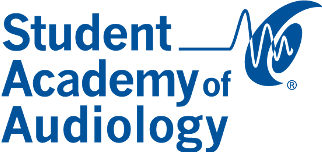 |
 |
In the unprecedented times of the coronavirus (COVID-19) global pandemic, the American Academy of Audiology recognizes that audiology students preparing to graduate or planning soon to start externship experiences are particularly vulnerable as they face uncertainties about the impact of the situation on their own circumstances. The Academy calls for a collective commitment of the extended audiology community to reassure our students and externs – the future of the profession—that we stand with them finding solutions and supporting them in their academic and clinical pursuits with minimal interruption. To that end, the Academy recommends the following considerations on behalf of audiology students:
- Audiology programs can maintain their commitment to preparing graduates competent to enter the audiology workforce. Rather than hold students to meeting a minimum requirement of clinical hours for completion that may be difficult to meet, programs can focus on developing effective strategies for assessing competency in students. Students preparing to graduate in the next month or so will likely already have met requirements, and so any student whose final hours may have been cut short by clinic closures should have the opportunity to demonstrate competence and be granted a degree. Students planning to enter externships soon may have shortened or disrupted experiences and similarly should be provided sufficient supplemental virtual or simulation experiences to allow them to demonstrate competency and graduate on time.
- Academic programs need to be creative and flexible in helping current and future students to complete their degrees without adding to the students’ existing financial burden. As clinical settings are adapting to offering telehealth services, academic programs can explore how to utilize telehealth and simulation to offer students the necessary experiences for building competence. The current expansion of telehealth across healthcare will likely extend far beyond the pandemic, and it is to the benefit of students to have exposure during their academic programs.
- To the extent possible, hospitals, clinics and audiology practices must do their best given current circumstances to honor externship commitments. For students currently completing externships, clinicians have the unique opportunity to engage students in the novel learning experiences available during the pandemic which includes virtual/remote audiology practice and other means of adapting typical clinical practice to a changing environment. We similarly urge these clinical practice sites to continue their partnerships with AuD programs as they relate to supporting students prior to externship. The Academy recognizes that there may need to be some adjustments to and adaptations of clinical experiences in light of the circumstances and challenges faced by many facilities; however, we urge all parties not to lose sight of the downstream effect on practice sites and our profession if we do not support our students.
- Academic programs and externship sites have a responsibility to student safety at all times and student assignments must always be considered in the context of safety. Students poised to begin an externship within the next couple of months need assurances that their externship is still in place. Again, externships and academic programs may need to adapt to the current times to reflect a hybrid of telehealth experiences, in-person direct patient care, and simulation.
- Academic programs and clinical sites must work in tandem to confirm commitments and to secure new opportunities, as needed. Academic programs may need to offer supplemental experiences through simulation to develop competency in some practice areas and to offset any limitations in externship sites created by the effect of the pandemic.
- Licensure boards can exert authority to offer flexibility and creativity in recognizing new graduates for licensure. Students graduating with a doctoral degree from an accredited program and passing a national exam should constitute appropriate candidates for licensure at this time. This should provide adequate assurance for protecting public safety and allows entrance of the next cohort of licensed audiologists into the field without unnecessary delay and hardship.
- Professional organizations, certifying bodies, accrediting bodi most important assets.
For more information, contact infoaud@audiology.org or saa@audiology.org.
 |
|
| Catherine V. Palmer, PhD President American Academy of Audiology |
J. Riley DeBacker President Student Academy of Audiology |
Related Posts
Volunteers Sought for Research Initiatives Task Force
Interested in participating in grant reviews? Want to engage with others about advancing clinical research in audiology? The Research Initiatives Task Force is looking for you! This…
Academy Welcomes New Vice President of Government Relations
On October 28, Joanne Zurcher, MPP, joined the Academy staff as the vice president of government relations and policy. In this role, Joanne will direct…
Update Your Member Profile
Keeping your member profile up-to-date is an important step in maximizing your member benefits including CEU reporting, Academy communications delivery, the Find an Audiologist Directory,…


